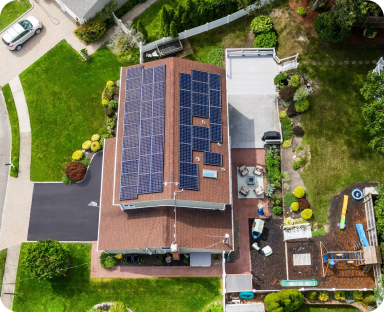Generating electricity from solar panels reduces the need to purchase electricity from the grid for electric vehicle (EV) charging. A properly sized solar system and solar EV charger can help you save on energy costs while conveniently charging your car at home. At EmPower Solar we develop, engineer, install, and service residential solar energy systems and install EV chargers. Here are several factors that can determine the solar system size you need to support your EV.
Daily Energy Consumption
A greater daily energy consumption level can require a larger solar system. To determine your energy consumption, estimate how many miles you drive your EV each day, along with the vehicle’s energy consumption in kilowatt hours (kWh) per mile. Some EVs have onboard displays that provide real-time energy consumption data. To calculate your daily energy consumption, multiply your daily driving distance by the energy consumption in kWh per mile. Homeowners driving around 12,000 miles each year may be able to power their EVs using five to 12 solar panels depending on the type of panels you choose. Our team of experts can help you determine the exact amount depending on your vehicle and other factors.
Efficient EVs typically require fewer charging sessions, saving you time and potentially reducing wear and tear on the battery. A level one charging station adds about four miles per hour to your car. Level two stations add 20 to 30 miles per hour. Level three chargers add 40 to 50 miles per hour, while V3 adds about 1,000 miles. We can help you pair a solar system with a suitable solar EV charger that meets your specific needs.
Solar Irradiance
Solar irradiance is the amount of solar energy that reaches a specific area on the earth’s surface. To maximize the benefits of solar irradiance, solar panels should be installed in a location and orientation that captures the most sunlight throughout the day. Making sure your solar system receives adequate sunlight can affect the amount of energy available to charge your EV at home. Our in-house design team can assess your home’s roof pitch, shading level, and nearby obstructions to optimize solar irradiance.
We can also perform solar site assessments to determine the ideal tilt and angles for your specific location. Some solar inverters are designed to handle shaded conditions more effectively. If shading is unavoidable, selecting inverters with advanced shade tolerance can help mitigate the impact on energy production.
Battery Capacity
Battery storage allows surplus solar energy produced during the day to be utilized during nighttime or periods of limited sunlight, like stormy days or wintertime. This storage can provide increased energy independence, reducing your reliance on the grid. It also allows you to charge your EV on demand.
When determining your recommended battery size, consider your total daily electricity consumption. This includes the energy required to charge your EV and power your home appliances. Our solar installers can recommend specific battery models, like the Tesla Powerwall, and capacities that align with your requirements.
Solar Panel Efficiency
Solar panels gather sunlight during the daytime and transform it into electrical energy, which is channeled through the system’s inverter. To estimate the number of solar panels you need for your solar system, our team will consider your daily electricity consumption and your location’s solar irradiance.
Higher-efficiency panels produce more electricity per unit of sunlight, meaning you can have the same energy with fewer panels. Our professional installers can help you determine the number of solar panels you need based on your electricity consumption and the range of your EV’s battery.
Invest in a Solar Energy System and Solar EV Charger Today
Based on your site assessment and energy needs, our solar installers can recommend the right-sized solar system for your home. EmPower Solar installers can also help you select suitable solar panels, inverters, and batteries compatible with your EV requirements and budget. Contact us today to customize a solar energy system that supports home EV charging.
Stop overpaying for electric. Go solar with $0 down.

Stop overpaying for electric. Go solar with $0 down.
About the Author
EmPower Solar develops, engineers, installs, and services solar and battery systems for residential and commercial clients. Since 2003, EmPower Solar has empowered thousands of New York homeowners and businesses with 47 megawatts of distributed solar. Its vision is to create a new energy paradigm powered by clean, renewable energy for a more prosperous, healthy, and civil world. The company culture is defined by the EmPowering Way, which results in consistent 5-star customer service reviews. For more information visit empower-solar.com.